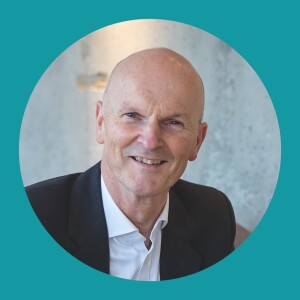
Dr Amar Rughani is a leadership mentor and former Sheffield GP, former Royal College of General Practitioners examiner and Blueprinting clinical lead, and co-author with Joanna Bircher of ‘The Leadership Hike: Shaping Primary Care Together.’
General practice didn’t become a specialty in its own right – in terms of having a compulsory licencing examination – until 2007. Amar was involved in defining what general practice involved. He believes good GPs engage first and foremost with people rather than with disease systems and lab tests. Understanding humanity is at the core of what GPs do.
Similarly leadership was just an expectation of GP colleagues rather than being defined or taught until recently. Amar set out to define it so that it could be taught. He’s no longer sure it can be defined or taught, but it has been an interesting journey. His interest in leadership also stemmed from his reflections on working with patients collaboratively to improve their lives.
He believes a strong argument can be made that effective leadership is highly context dependent. He found that much of the business literature on leadership – promoting positional power, control, personal achievement, and reward as motivators – didn’t really resonate with him. The values of primary care are more to do with compassion, community, engaging with complexity, openness, and honesty. And so he felt that he had to write the book, because he couldn’t find anything out there that said what was needed in a GP context.
The book itself is “totally an exercise in compassionate leadership.” Amar says that he wanted to convey that he and Joanna did not have all the answers, but that people really matter, and “what they can do for their community matters for the whole world.” They called the book a ‘hike’ because they wanted people to feel that Amar and Joanna were accompanying them on their journey.
In the book Amar says “maybe we should ask ourselves whether, if we rarely feel uncomfortable or need to use our courage, we are actually engaging in leadership at all.” If we are going to change things then first we will have to “stick our head above the parapet.” We’ve noticed that there is a problem and we care enough to actually say so.
He also says “it is humbling to appreciate that so much of what differentiates people who are given higher or lower status by society is not determined, for example, by genetics or talent, but by resources, opportunity and support” and feels that the more we see ourselves as an elite, the more disconnected we are liable to become from the people we serve.
Leaders generally operate along two dimensions – task and people – and the people dimension is normally harder. People need to be willing to connect with you, and to give their ‘discretionary effort.’ They won’t do that unless they feel their ideas are welcomed, they are going to be supported, given some resource perhaps, and receive some acknowledgement. But the start of it all is that they don’t feel that you look down on them or talk down to them.
Amar maintains “our greatest potential for developing our most useful contributions lies not in the areas where we are weak, but in the areas where we are already strong.” At a traditional GP appraisal, weaknesses are identified and the expectation is that over the coming year you will spend time remedying your deficits. He found the work of the Gallup organisation, which is summarised in the book Strengths Finder 2.0, revelatory. That research revealed that a great number of measures of personal effectiveness were positively correlated with the ability of people to connect with what they were singularly good at. Therefore, one of the arts of leadership is to support people to engage with those strengths and apply them.
Amar observes that in primary care, ones work can be so reactive that there seems to be little time to do much other than firefighting. However, it is nonetheless essential to clarify vision and direction. In his practice Amar promoted this by encouraging people to reconnect with the ‘why’ both in one-to-one conversations and in group discussions. You can also learn much about the ‘why’ of an organisation by observing what energises people, what they celebrate, what they discuss with passion over coffee.
Towards the end of the book Amar warns “Power corrupts. No-one is exempt.” However, there are strategies we can adopt to resist the temptation to become grandiose and even abuse our leadership power. He believes we need to find the balance between the overuse of power, associated with coercion and control, and the opposite position where we seek to avoid influencing others altogether. To do that we need to “keep our antennae twitching” and sense how we are coming across to others. “How are people with us?” is a question explored in the book.
On his journey Amar was inspired by Pat Lane, who was a regional director in medical education. He had a number of qualities that hugely helped Amar, and Amar has tried to bring them into his own life. He was a person of great energy, enthusiasm, and drive. He encouraged people who had original ideas, and backed up his encouragement with resources.
Apart from his own book (!), Amar would recommend Simon Sinek’s TED Talk ‘How great leaders inspire action’, Sir Ken Robinson’s TED Talk ‘Do schools kill creativity?’, and Neil McGregor’s series of podcasts, ‘A history of the word in 100 objects.’ He would also recommend Otto Scharmer’s book ‘Theory U.’
Amar’s self-care regime includes walking, working out, and yoga. He maintains a spiritual life, and he also has fun, and tries to “be fun.”
His advice to his 20-year-old self would be: “You don’t necessarily have to slow down, but just linger... a little between the events of each day… what happens in the spaces is what really helps you to savour life.”
More Episodes
 2020-05-14
2020-05-14
 2020-02-20
2020-02-20
 2020-01-02
2020-01-02
 2019-12-19
2019-12-19
 2019-11-14
2019-11-14
Create your
podcast in
minutes
- Full-featured podcast site
- Unlimited storage and bandwidth
- Comprehensive podcast stats
- Distribute to Apple Podcasts, Spotify, and more
- Make money with your podcast
It is Free
- Privacy Policy
- Cookie Policy
- Terms of Use
- Consent Preferences
- Copyright © 2015-2024 Podbean.com






